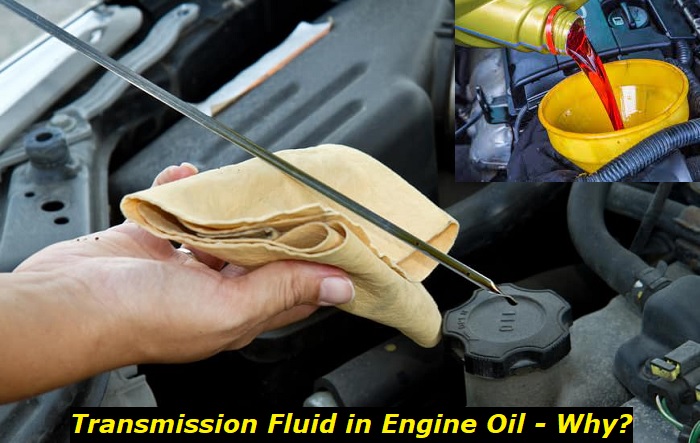Transmission fluid is an important part of the car's transmission system. It protects the moving parts of the transmission and protects them from damage. It also helps keep the transmission cool and provides the hydraulic power necessary to make some parts work. In many ways, it acts like engine oil does in the engine. However, these two fluids never normally meet in an engine.
Oil system cleaning highlights
- Level of urgency:medium
- Average mileage:not related to mileage
- Repair cost:$0 - $250
- DIY repair:possible
- Commonreasons:usingbadengine flushing methods
- If ignored:engine damage, poor lubrication
- How to solve:use proper oil andnormalintervals,don't flush the engine if it's notneeded

Why is Transmission Fluid in My Engine Oil?
Finding fluids in the wrong part of your car is always a worrying situation. Your first thought might be that there is a leak, or a gasket is starting to fail. While this is usually the case, it doesn't quite apply in the case of transmission fluid in the engine oil, except in a certain special case (more on that later).
The transmission is a closed, tightly controlled system that doesn't meet with the engine at many points. Generally, there is not much opportunity for the engine oil and transmission fluid to meet or mix.
This might sound confusing. How is it possible to find transmission fluid in your engine oil if they can't leak into each other? There are three major possibilities.
1) Transmission Fluid was Added to Engine Oil by Accident
The most common reason that you might find transmission fluid in your engine oil is that it was added there by accident. It is possible that someone poured transmission fluid into the wrong compartment. Another common mishap is mistaking transmission fluid for engine oil.
It is possible that this mistake was made by an inexperienced or distracted mechanic. It's also possible that you made this mistake yourself without realizing it.
2) Transmission Fluid was Added to Engine Oil on Purpose
Sometimes transmission fluid is added to engine oil on purpose. This doesn't mean that someone was trying to sabotage your engine. Some car owners believe that adding transmission fluid to the engine oil cleans out the system and makes the engine run like new. There is no direct evidence that this works, and some car owners believe that it even has negative effects on the engine.
If you find engine oil in your transmission, consider asking anyone else that uses the car if they added transmission fluid to the engine oil. Perhaps someone was trying to clean out the engine to get it to run more smoothly.
If you've recently had an oil change or gone to a mechanic, you should consider contacting the mechanic and finding out whether they were the ones that added transmission fluid to your engine. Many mechanics swear by transmission fluid as a way of cleaning out an engine.
3) Vacuum Modulator Leak
This might seem like a contradiction. After all, we stated that the transmission and the engine oil can't leak into each other, right? This is the special case we mentioned earlier. In certain older cars, the transmission fluid can be sucked into the intake manifold if a leak develops in a transmission line. This is a result of how some older engines are designed.
In older cars, about pre-1985, shifting was controlled by hydraulic pressure, valves, and vacuums, instead of electronically. These transmissions had a vacuum modulator that responded to throttle position information. If the modulator were to develop a leak, then transmission fluid could be sucked out of the transmission and into the intake manifold. This would typically result in transmission fluid burning in the engine and causing blue exhaust gas. In some cases, this would allow the leaking transmission fluid to end up in the engine oil.
This problem is more or less eliminated in modern cars because of the switch to electronic transmission control, so only consider this cause if you have an older car.
What Effects Will This Have on the Engine?
Finding fluids in the wrong part of the car is usually a bad sign. For example, finding engine oil in your coolant is a sign that your head gasket has blown, which can cause further damage to the cooling system and the car in general if it is not taken care of.
Fortunately, transmission fluid and engine oil are rather similar fluids. They serve similar purposes and have somewhat similar properties. They differ slightly in viscosity, however, and transmission fluid comes with additives that are tailored to work specifically in the transmission system. Generally, however, transmission fluid in the engine oil will have little to no effect on the engine or its performance.
There are some considerations, however. The extent of the effect of transmission fluid on the engine will depend on the amount that has been added to the engine oil.
If a small or relatively small amount of transmission fluid has been added to a full oil tank, you have no reason to worry. The transmission fluid will be diluted by the volume of oil, and won't have much effect. Remember that it acts similarly to engine oil.
If a large amount of transmission fluid has been added to a smaller volume of engine oil, you might start to experience degraded engine performance. This is because the smaller volume of engine oil won't effectively dilute the transmission fluid. And while transmission fluid performs a similar function to engine oil, it is not specifically formulated for use in engines. The viscosity is typically lower, making it less effective at lubricating engine parts. It also degrades more easily than engine oil because it isn't built for the temperatures achieved in the engine.
Transmission fluid should never be added to an empty or very low oil tank. Transmission fluid cannot act as a replacement for engine oil, and this will cause damage to the engine.
What Should I Do About Transmission Fluid in My Engine Oil?
If you've recently found transmission fluid in your engine oil, you might wonder what you should do about it. Should you ignore it, or should you change your oil?
Changing your oil is always a safe step, but it is unnecessary if the volume of engine oil in the tank is high, and the amount of transmission fluid is low. The engine will continue to run fine in this condition, and the transmission fluid will have very little effect.
If there is a large amount of transmission fluid in your engine oil, you will need to have your oil changed. While there is a chance that your engine will continue to run fine in this state, the additives in the transmission fluid could cause the formation of sludge in your engine. You might also notice a decline in performance from the compromised engine oil.
Does Transmission Fluid Actually Flush Out the Engine?
Transmission fluid usually has detergents added to it. These detergents break down deposits in the system and flush them out. While these detergents can also clean out deposits from the engine, the real problem originates from the additives.
Additives in transmission fluid will disrupt and interfere with the additives that have been added to the engine oil. Many of these additives have no function in the engine, and could even form deposits and sludge in the engine when they break down from the engine's heat.
Adding transmission fluid to engine oil will not flush out the engine. At best it will have no effect, and at worst, it will cause damage to the engine.
The additives in the engine oil are usually enough to clean out the engine. If the engine oil is really dirty, you can flush out the engine by performing an oil change. All of the sludge and dirt that has built up in the oil will come out when the oil is changed.
Conclusion
Transmission fluid in your engine oil isn't an ideal situation, but it isn't a disaster either. There aren't many mechanical issues that can cause transmission fluid to get into your engine oil. Even with an old car that has a leaking vacuum manifold, transmission fluid is much more likely to burn in the engine than to get into the engine oil.
In most cases, transmission fluid ends up in the engine oil when it is added there, either on purpose or by accident. A likely cause is a mechanic adding some transmission fluid to the engine oil when performing an oil change, either by accident or to flush the engine.
Transmission fluid will not have much effect on the engine in small amounts. If a large amount of transmission fluid is in the engine oil, you will need to perform an oil change to prevent damage.
About the authors
The CarAraC research team is composed of seasoned auto mechanics and automotive industry professionals, including individuals with advanced degrees and certifications in their field. Our team members boast prestigious credentials, reflecting their extensive knowledge and skills. These qualifications include: IMI: Institute of the Motor Industry, ASE-Certified Master Automobile Technicians; Coventry University, Graduate of MA in Automotive Journalism; Politecnico di Torino, Italy, MS Automotive Engineering; Ss. Cyril and Methodius University in Skopje, Mechanical University in Skopje; TOC Automotive College; DHA Suffa University, Department of Mechanical Engineering






Add comment